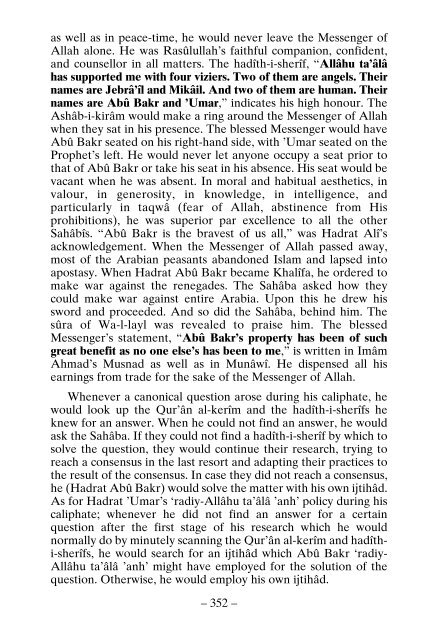Sahaba - The Blessed
At the beginning of the book (The Blessed) superiority of Ashâb of our prophet, Muhammad ´alayhissalâm, is explained along with how unjust and ignorant are those who defame Ashâb-ı-kirâm. Besides, the meaning of ijtihâd is explained. In the part of cautioning, an answer is given to the book (Hüsniyye) written by an enemy of Islam. In another part, biographies of great savants of Islam - hadrat Imâm-ı Rabbâni and hadrat Sayyed Abdülhakîm-ı Arvâsi - are explained. In the part Two Apples of the Eye of Muslims superiority of hadrat Abû Bakr and hadrat Omar is explained; in the part The First Fitna in Islam events between Ashâb-ı-kirâm are explained beautifully from the pen of hadrat Imâm-ı Rabbâni Ahmad Fârûkî Sarhandi who explains that to love all of Ashâb-ı-kirâm is a fundamental condition of being Ahl-i-sunnat.
At the beginning of the book (The Blessed) superiority of Ashâb of our prophet, Muhammad ´alayhissalâm, is explained along with how unjust and ignorant are those who defame Ashâb-ı-kirâm. Besides, the meaning of ijtihâd is explained. In the part of cautioning, an answer is given to the book (Hüsniyye) written by an enemy of Islam. In another part, biographies of great savants of Islam - hadrat Imâm-ı Rabbâni and hadrat Sayyed Abdülhakîm-ı Arvâsi - are explained. In the part Two Apples of the Eye of Muslims superiority of hadrat Abû Bakr and hadrat Omar is explained; in the part The First Fitna in Islam events between Ashâb-ı-kirâm are explained beautifully from the pen of hadrat Imâm-ı Rabbâni Ahmad Fârûkî Sarhandi who explains that to love all of Ashâb-ı-kirâm is a fundamental condition of being Ahl-i-sunnat.
You also want an ePaper? Increase the reach of your titles
YUMPU automatically turns print PDFs into web optimized ePapers that Google loves.
as well as in peace-time, he would never leave the Messenger of<br />
Allah alone. He was Rasûlullah’s faithful companion, confident,<br />
and counsellor in all matters. <strong>The</strong> hadîth-i-sherîf, “Allâhu ta’âlâ<br />
has supported me with four viziers. Two of them are angels. <strong>The</strong>ir<br />
names are Jebrâ’îl and Mikâil. And two of them are human. <strong>The</strong>ir<br />
names are Abû Bakr and ’Umar,” indicates his high honour. <strong>The</strong><br />
Ashâb-i-kirâm would make a ring around the Messenger of Allah<br />
when they sat in his presence. <strong>The</strong> blessed Messenger would have<br />
Abû Bakr seated on his right-hand side, with ’Umar seated on the<br />
Prophet’s left. He would never let anyone occupy a seat prior to<br />
that of Abû Bakr or take his seat in his absence. His seat would be<br />
vacant when he was absent. In moral and habitual aesthetics, in<br />
valour, in generosity, in knowledge, in intelligence, and<br />
particularly in taqwâ (fear of Allah, abstinence from His<br />
prohibitions), he was superior par excellence to all the other<br />
Sahâbîs. “Abû Bakr is the bravest of us all,” was Hadrat Alî’s<br />
acknowledgement. When the Messenger of Allah passed away,<br />
most of the Arabian peasants abandoned Islam and lapsed into<br />
apostasy. When Hadrat Abû Bakr became Khalîfa, he ordered to<br />
make war against the renegades. <strong>The</strong> Sahâba asked how they<br />
could make war against entire Arabia. Upon this he drew his<br />
sword and proceeded. And so did the Sahâba, behind him. <strong>The</strong><br />
sûra of Wa-l-layl was revealed to praise him. <strong>The</strong> blessed<br />
Messenger’s statement, “Abû Bakr’s property has been of such<br />
great benefit as no one else’s has been to me,” is written in Imâm<br />
Ahmad’s Musnad as well as in Munâwî. He dispensed all his<br />
earnings from trade for the sake of the Messenger of Allah.<br />
Whenever a canonical question arose during his caliphate, he<br />
would look up the Qur’ân al-kerîm and the hadîth-i-sherîfs he<br />
knew for an answer. When he could not find an answer, he would<br />
ask the Sahâba. If they could not find a hadîth-i-sherîf by which to<br />
solve the question, they would continue their research, trying to<br />
reach a consensus in the last resort and adapting their practices to<br />
the result of the consensus. In case they did not reach a consensus,<br />
he (Hadrat Abû Bakr) would solve the matter with his own ijtihâd.<br />
As for Hadrat ’Umar’s ‘radiy-Allâhu ta’âlâ ’anh’ policy during his<br />
caliphate; whenever he did not find an answer for a certain<br />
question after the first stage of his research which he would<br />
normally do by minutely scanning the Qur’ân al-kerîm and hadîthi-sherîfs,<br />
he would search for an ijtihâd which Abû Bakr ‘radiy-<br />
Allâhu ta’âlâ ’anh’ might have employed for the solution of the<br />
question. Otherwise, he would employ his own ijtihâd.<br />
– 352 –

















